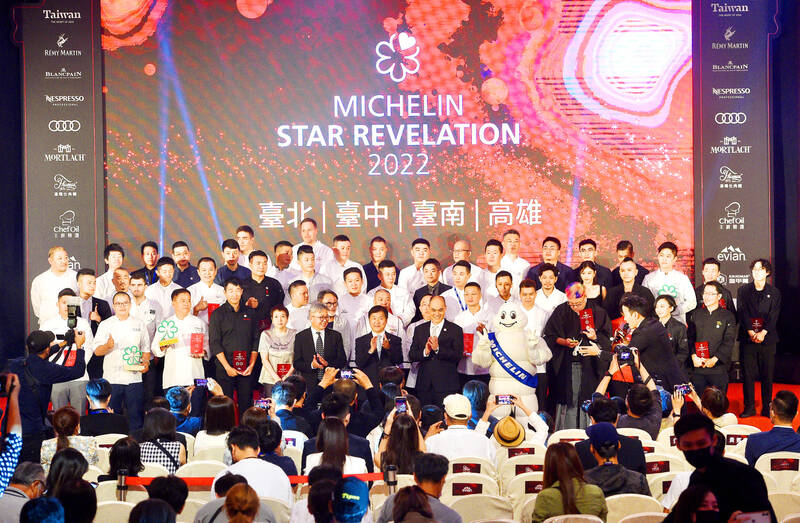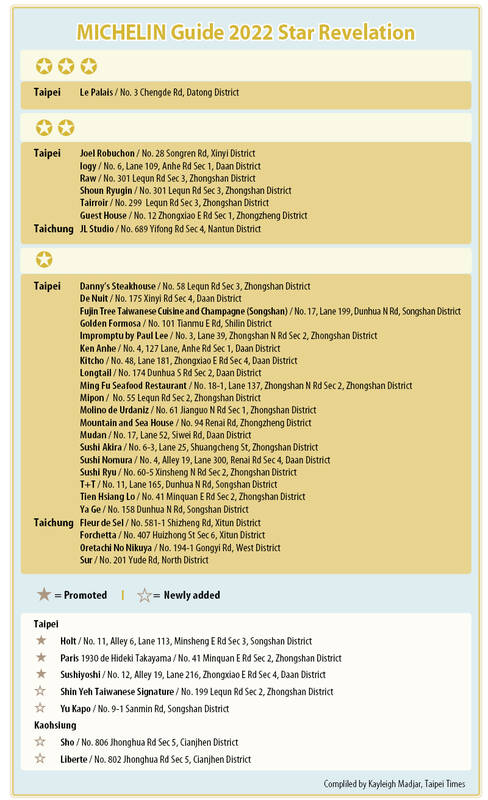No restaurants in Tainan were awarded stars by the Michelin Guide this year, despite the city’s reputation as the capital of traditional Taiwanese food.
The France-based gourmet publication began evaluating restaurants in Taipei in 2018, with eateries in Taichung included in 2020.
Michelin Guide inspectors expanded their culinary search this year by also evaluating restaurants in Tainan and Kaohsiung.

Photo: Lo Pei-te, Taipei Times
Michelin yesterday morning unveiled its list for this year of 38 starred restaurants in Taiwan at the Mandarin Hotel in Taipei. Tainan was the only one of the four cities that did not have a restaurant with a star rating.
Instead of expressing disappointment, people from Tainan said they could not care less about the result, with some even saying that they were relieved.
“We would not be called the gourmet capital of Taiwan if we did not have taste buds that can scrutinize food quality better than those of Michelin food inspectors. We are proud of our tasty food and do not need to have it reviewed by the Michelin Guide,” a resident surnamed Chao (趙) wrote on the Tainan-Style Facebook page.

GRAPHIC: TT
“I thank Michelin Guide for giving us a break, otherwise lines outside popular restaurants here would be long enough to reach Pingtung County,” another person surnamed Yeh (葉) wrote.
Others said that while food in Tainan is delicious, it has a long way to go regarding overall quality in the city.
Minister of Transportation and Communications Wang Kwo-tsai (王國材) said that he respects the Michelin Guide for using consistent criteria to evaluate restaurants around the world.
That many restaurants serving traditional Taiwanese food in Tainan made it onto the guide’s Bib Gourmand list showed that food in the city is recognized by the publication, Wang said.
Many cities use the Michelin Guide as a way to attract tourists, and restaurants that want a star rating have to work hard to achieve it, he said.
It is not the first time the tastes of Michelin food inspectors have clashed with those of locals; many have said that Din Tai Fung should receive a star.
Seven restaurants were added to the list of one-star restaurants this year, including Holt, Paris 1930 de Hideki Takayama, Shin Yeh Taiwanese Signature, Sushiyoshi and Yu Kapo in Taipei, as well as Sho and Liberte in Kaohsiung.
Restaurants that retained their one star were: Danny’s Steakhouse, De Nuit, Fujin Tree Taiwanese Cuisine and Champagne (Songshan), Golden Formosa, Impromptu by Paul Lee, Ken Anhe, Kitcho, Longtail, Ming Fu Seafood Restaurant, Mipon, Molino de Urdaniz, Mountain and Sea House, Mudan, Sushi Akira, Sushi Nomura, Sushi Ryu, T+T, Tien Hsiang Lo and Ya Ge in Taipei, as well as Fleur de Sel, Forchetta, Oretachi No Nikuya and Sur in Taichung.
In Taipei, Da-Wan Yakiniku Dining Restaurant and A Cut failed to retain their one-star rating this year.
Seven of last year’s eight two-star restaurants retained their status: JL Studio in Taichung, and L’Atelier de Joel Robuchon, Logy, RAW, Shoun Ryugin, Tairroir and The Guest House in Taipei.
Sushi Amamoto did not make it onto the list of two-star restaurants. No new restaurants gained two stars.
Le Palais of the Palais de Chine Hotel remains the only three-star restaurant in Taiwan. It has maintained this status since 2018.
Mountain and Sea House, Yang Ming Spring (Shilin), Embers and Little Tree Food (Daan Road) in Taipei were given Green Stars for their sustainable management.

Taiwan yesterday condemned the recent increase in Chinese coast guard-escorted fishing vessels operating illegally in waters around the Pratas Islands (Dongsha Islands, 東沙群島) in the South China Sea. Unusually large groupings of Chinese fishing vessels began to appear around the islands on Feb. 15, when at least six motherships and 29 smaller boats were sighted, the Coast Guard Administration (CGA) said in a news release. While CGA vessels were dispatched to expel the Chinese boats, Chinese coast guard ships trespassed into Taiwan’s restricted waters and unsuccessfully attempted to interfere, the CGA said. Due to the provocation, the CGA initiated an operation to increase

CHANGING LANDSCAPE: Many of the part-time programs for educators were no longer needed, as many teachers obtain a graduate degree before joining the workforce, experts said Taiwanese universities this year canceled 86 programs, Ministry of Education data showed, with educators attributing the closures to the nation’s low birthrate as well as shifting trends. Fifty-three of the shuttered programs were part-time postgraduate degree programs, about 62 percent of the total, the most in the past five years, the data showed. National Taiwan Normal University (NTNU) discontinued the most part-time master’s programs, at 16: chemistry, life science, earth science, physics, fine arts, music, special education, health promotion and health education, educational psychology and counseling, education, design, Chinese as a second language, library and information sciences, mechatronics engineering, history, physical education

The Chinese military has boosted its capability to fight at a high tempo using the element of surprise and new technology, the Ministry of National Defense said in the Quadrennial Defense Review (QDR) published on Monday last week. The ministry highlighted Chinese People’s Liberation Army (PLA) developments showing significant changes in Beijing’s strategy for war on Taiwan. The PLA has made significant headway in building capabilities for all-weather, multi-domain intelligence, surveillance, operational control and a joint air-sea blockade against Taiwan’s lines of communication, it said. The PLA has also improved its capabilities in direct amphibious assault operations aimed at seizing strategically important beaches,

‘MALIGN PURPOSE’: Governments around the world conduct espionage operations, but China’s is different, as its ultimate goal is annexation, a think tank head said Taiwan is facing a growing existential threat from its own people spying for China, experts said, as the government seeks to toughen measures to stop Beijing’s infiltration efforts and deter Taiwanese turncoats. While Beijing and Taipei have been spying on each other for years, experts said that espionage posed a bigger threat to Taiwan due to the risk of a Chinese attack. Taiwan’s intelligence agency said China used “diverse channels and tactics” to infiltrate the nation’s military, government agencies and pro-China organizations. The main targets were retired and active members of the military, persuaded by money, blackmail or pro-China ideology to steal